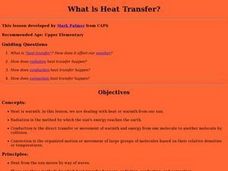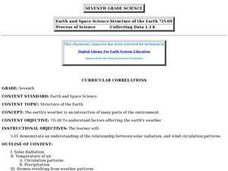Curated OER
CO2 and Air Pollution
Seventh graders observe and test for the presence of carbon dioxide gas. They compare concentrations of carbon dioxide gas and conclude high concentrations of carbon dioxide gas are unhealthy for human beings.
Space Awareness
Water is a Heat Sink
One of the key objectives of Europe's Copernicus Earth program is to monitor the temperatures of the oceans and seas on Earth. Young scholars learn the effects of different heat capacities through two experiments. These experiments...
Curated OER
Is Air a Fluid?
Students use baking soda, vinegar, matches, and other materials to pour gas. In this air lesson plan, students use the materials to pour gas and learn that air can be a fluid like a liquid.
Curated OER
Is Air a Fluid?
Students discuss the physical properties of fluids and then demonstrate that air carbon dioxide and oxygen) is a fluid by creating currents.
Curated OER
What's the Connection Between Convection and Inversion?
Ninth graders observe a simulation demonstrating the difference between convection and inversion. They explain where and when convection and inversion layers occur and how each impacts air quality, and by connection, human health.
Curated OER
Blowin' in the Wind
Students discover how wind is created on earth: changes in temperatures and air pressure. They list good and bad effects of the wind and make a weather vane and practice using it for 2 weeks.
Curated OER
Greenhouse Gases
Although the worksheet for the lab activity is not included, this is an activating activity for your class to do when learning about the greenhouse effect. They lay three thermometers underneath a lamp: one out in the open, one under a...
Curated OER
Convection in a Pan
Students watch a demonstration using a plastic bag and a hair dryer to create a hot air balloon. After the demonstration, they discuss the results and whether or not hot water behaves the in the same manner as hot air. They conduct...
Curated OER
Color of Stars
Students study the color of stars. For this astronomy based lesson, students observe the colors in an open flame and apply the information collected about color and temperature to the visible light emitting from the photosphere of...
Curated OER
Carbon Dioxide: The Heat is On
Students examine the greenhouse gases affecting the atmosphere. In groups, they participate in activities in which they examine the effects of heat on the atmosphere and phytoplankton. They research how the phytoplankton differ in warm...
Curated OER
Energy/Light/Heat/Sound
Fourth graders study the properties of heat in this series of lessons. They discuss sources of heat and experiment to determine its properties. They identify insulators and conductors by measuring temperatures, and graphing their data....
Curated OER
Weather Facts
Learners study weather and weather measurement tools. In this weather instructional activity, students read and discuss weather myths and superstitions as well as weather terminology. Learners then work in groups to complete weather...
Curated OER
Popcorn Science: Pop Goes the Kernel!
Students conduct various experiments to determine why popcorn pops. They design tests to determine the effect of water in the kernels on its popping. Once the experiments are completed, they write summaries of them proving or...
Curated OER
Ziplock Chemistry
Students investigate various chemical reactions when creating mixtures in ziplock baggies. In this chemistry lesson, students will recognize various chemical reactions and cite evidence. Safety and assessment strategies are included in...
Curated OER
Convection in a Pan
Students explore convection. In this lesson on heat and energy, students investigate how heat moves in convection currents. They use their finding to better understand how convection currents effect the movement of tectonic plates.
Curated OER
Earth's Weather
Seventh graders learn how solar radiation, latitude, and other factors affect weather. They break into six groups and are assigned a topic to research and to present their findings orally.


















